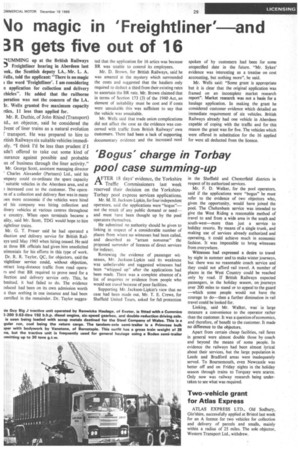Vo magic in 'Freightliner' BR gets five out of 16
Page 31

If you've noticed an error in this article please click here to report it so we can fix it.
ZUMMING up at the British Railways 7 Freightliner hearing in Aberdeen last 'eek, the Scottish deputy LA,Mr. L. A. Veils, told the applicant: "There is no magic the word 'Freightliner'. I am considering n application for collection and delivery Aides". He added that the railborne peration was not the concern of the LA. Ir. Wells granted five maximum capacity rtics, 11 less than applied for.
Mr. R. Duthie, of John Rhind (Transport) td., an objector, said he considered the ivent of liner trains as a natural evolution [transport. He was prepared to hire to ritish Railways six suitable vehicles immedi.ely. "I think I'd be less than prudent if I Idn't offered to take out some kind of isurance against possible and probable Iss of business through the liner activity." Mr. George Scott, assistant managing director ' Charles Alexander (Partners) Ltd., said his anpany could co-ordinate the spare capacity suitable vehicles in the Aberdeen area, and at ) increased cost to the customer. The opera )fl of a collection and delivery fleet was in many ices more economic if the vehicles were hired id his company was hiring collection and livery vehicles at various centres throughout e country. When open terminals became a ality, said Mr. Scott, TDG would hope to hire ,T.ightliner trains.
Mr. G. T. Fraser said he had operated a illection and delivery service for British Railays until May 1965 when hiring ceased. He said at three BR officials had given him unsolicited stimonials for his efforts in this type of work. Dr. R. R. Taylor, QC. for objectors, said the -eightliner service could, without objection, ostract long-distance traffic from road operars and that BR required to prove need for a Ilection and delivery service only. This, he bmitted. it had failed to do. The evidence oduced had been on its own admission worth s than nothing in one instance and had been certified in the remainder. Dr. Taylor sugges
ted that the application for 16 artics was because BR was unable to control its employees.
Mr. D. Brown, for British Railways, said he was amazed at the mystery which surrounded the costs and suggested that the hauliers only required to deduct a third from their existing rates to ascertain the BR rate. Mr. Brown claimed that in terms of Section 173 (3) of the 1960 Act, an element of suitability must be cost and if costs were unsuitable this was sufficient to say that the vehicle was unsuitable.
Mr. Wells said that trade union complications did not affect the case as the evidence was concerned with traffic from British Railways' own customers. There had been a lack of supporting documentary evidence and the increased need spoken of by customers had been for some unspecified date in the future. "Mr. Sykes' evidence was interesting as a treatise on cost accounting, but nothing more", he said.
Mr. Wells said: "Some grant is appropriate but it is clear that the original application was framed on an incomplete market research report". Market research was not a basis for a haulage application. In making the grant he considered customer evidence which detailed an immediate requirement of six vehicles. British Railways already had one vehicle in Aberdeen capable of coping with the traffic and for this reason the grant was for five. The vehicles which were offered in substitution for the 16 applied for were all deducted from the licence.




























































































































